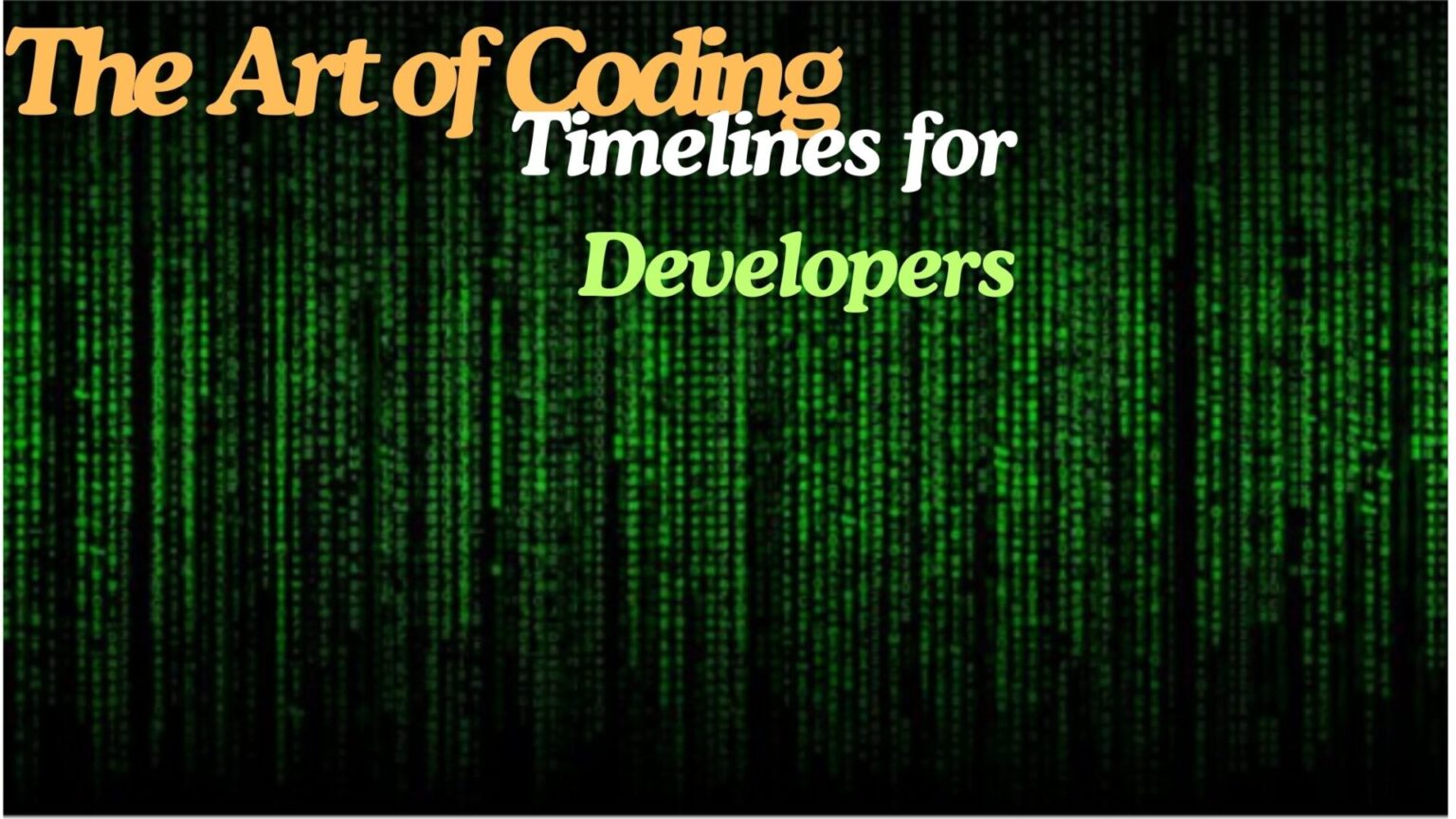Introduction:-
The Art of Coding: Timelines for Aspiring Developers

In our rapidly evolving digital age, coding has emerged as a crucial skill, akin to literacy in the digital realm. It empowers individuals to create websites, applications, and software, enabling them to turn their creative visions into functional realities. Aspiring developers often wonder about the journey ahead and the timeline it takes to become proficient in coding. In this article, we’ll delve into the art of coding and provide realistic timelines for those embarking on this exciting path.
How can we explore the art of coding more comprehensively and establish realistic timelines for individuals starting their journey in this exciting field?
The Foundations: Understanding the Basics
Before you dive into the world of coding, it’s essential to understand its fundamental principles and the various languages and technologies available. This initial phase can vary in duration based on your prior experience and the resources you have at your disposal.
1. Beginner Level (2-3 Months)
- HTML & CSS: Start with the building blocks of the web – HTML and CSS. These are relatively easy to grasp and form the foundation for web development.
- Introduction to Programming Concepts: Understand essential programming concepts like variables, data types, and control structures. This knowledge serves as a bridge to more complex languages.
2. Intermediate Level (3-6 Months)
- JavaScript: Move on to JavaScript, a versatile language for web development. Explore libraries like jQuery to streamline web development tasks.
- Version Control (e.g., Git): Learn version control to manage code efficiently, collaborate with others, and track changes.
- Responsive Web Design: Dive into responsive design principles to create websites that adapt to various devices and screen sizes.
Building Proficiency: Developing Your Skills
Once you have a solid foundation, it’s time to deepen your understanding of coding and expand your skill set.
3. Advanced Level (6-12 Months)
- Front-End Frameworks (e.g., React, Angular, or Vue.js): Choose a front-end framework that aligns with your goals and dive into it. These frameworks help you build interactive web applications.
- Back-End Development: Explore back-end development languages like Python, Ruby, PHP, or Node.js. This opens the door to creating dynamic web applications with server-side logic.
- Databases: Learn about databases and how to work with them using SQL or NoSQL databases like MySQL, PostgreSQL, or MongoDB.
4. Specialization (Varies)
- Full-Stack Development: If you aim to become a full-stack developer, continue honing your front-end and back-end skills. This phase can take several months to a year or more, depending on your dedication.
- Specialized Tracks (e.g., Data Science, DevOps, Mobile Development): If you opt for a specialized track, your timeline will vary. For instance, data science may require additional time to master machine learning algorithms and data analysis.
Real-World Application: Building Projects
Learning to code isn’t just about acquiring theoretical knowledge; it’s about applying what you’ve learned to real projects. Practical experience is invaluable.
5. Project Development (Ongoing)
- Personal Projects: Start with small personal projects, such as personal websites, simple web apps, or games. These projects help you apply your skills and build a portfolio.
- Open Source Contributions: Contribute to open-source projects to collaborate with experienced developers and gain exposure to real-world coding practices.
Continuous Learning: Staying Updated
Coding is an ever-evolving field, and staying current with the latest technologies and trends is essential.
6. Lifelong Learning (Ongoing)
- Continuous Learning: Dedicate time to learning new technologies, languages, and frameworks as they emerge.
- Networking: Join coding communities, attend meetups, and participate in coding forums to stay connected with the coding world.
The Timeline: Realistic Expectations
The timeline for becoming a proficient developer varies significantly from person to person and depends on several factors:
1. Learning Speed
Your ability to grasp coding concepts and languages will influence your timeline. Some individuals may learn more quickly, while others may need more time to digest the material.
2. Prior Experience
If you have prior experience in related fields, such as graphic design or mathematics, you may find some aspects of coding more accessible. This can expedite your learning journey.
3. Learning Resources
The availability and quality of learning resources play a significant role. High-quality courses, tutorials, and mentorship can accelerate your progress.
4. Dedication and Practice
Consistent practice and dedication to coding are vital. Those who invest more time and effort tend to progress faster.
5. Specialization
Your choice of specialization can impact your timeline. Some specializations, like front-end development, may have shorter learning curves than data science or machine learning.
With these factors in mind, let’s outline a general timeline for becoming a proficient coder:
7. General Timeline
- Beginner Level: 2-3 months
- Intermediate Level: 3-6 months
- Advanced Level: 6-12 months
- Specialization: Varies (additional 6 months to several years)
- Project Development: Ongoing
- Lifelong Learning: Ongoing
Remember that this timeline is a rough estimate and can vary widely based on individual circumstances. The key is to focus on continuous improvement and embrace the journey of learning. Coding is a skill that rewards persistence and curiosity.
In which areas can one earn money by learning the art of coding?
Learning the art of coding can open up various opportunities to earn money in different areas. Here are some of the key areas where coding skills can lead to lucrative career opportunities:

- Software Development: Building software applications, whether for desktop, mobile, or web platforms, is one of the most common and profitable career paths for coders. Developers can work on creating everything from mobile apps and video games to enterprise software solutions.
- Web Development: Web developers specialize in creating websites and web applications. This field includes front-end developers who focus on user interfaces (UI) and back-end developers who handle server-side programming and databases.
- Data Science and Machine Learning: Coding skills are essential for data scientists and machine learning engineers who analyze large datasets, develop predictive models, and build AI systems. These roles are in high demand, especially in industries like finance, healthcare, and e-commerce.
- Cybersecurity: Ethical hackers, security analysts, and cybersecurity experts use coding to protect systems and networks from cyber threats. They identify vulnerabilities and develop security measures to safeguard data and infrastructure.
- Game Development: Game developers create video games for various platforms, including consoles, PC, and mobile devices. This field combines coding with creativity and can be financially rewarding.
- Blockchain Development: Coders with expertise in blockchain technology can work on developing decentralized applications (DApps) and smart contracts. The blockchain space offers opportunities in cryptocurrencies and decentralized finance (DeFi).
- Mobile App Development: Building mobile apps for iOS and Android platforms is a specialized field within software development. Developers can earn money by creating apps for businesses or by launching their own successful apps.
- Freelancing and Consulting: Many coders choose to work as freelancers or consultants, offering their coding skills on a project-by-project basis. This allows for flexibility and the potential to earn based on demand.
- DevOps and Cloud Computing: DevOps engineers and cloud architects use coding to automate and manage infrastructure and deployment processes. Cloud service providers like AWS, Azure, and Google Cloud offer certifications and job opportunities in this area.
- Quantitative Finance: Coding is essential in quantitative finance, where professionals use algorithms and data analysis to make financial decisions and develop trading strategies.
- Artificial Intelligence and Natural Language Processing: AI developers work on creating intelligent systems, chatbots, and applications that can understand and interact with natural language. This field is relevant in industries like customer service and healthcare.
- IoT (Internet of Things) Development: IoT developers build applications and systems that connect physical devices to the internet, enabling automation and data collection from smart devices.
Remember that the specific area you choose will influence your earning potential, as demand and compensation can vary widely depending on the field and your level of expertise. Continuously upgrading your coding skills and staying up-to-date with industry trends can also contribute to your earning potential in the coding profession.
Conclusion
The art of coding is a journey filled with challenges and rewards. It offers the opportunity to bring your ideas to life, solve complex problems, and contribute to a rapidly evolving digital landscape. While timelines for becoming a proficient coder can vary, the key to success lies in dedication, continuous learning, and a passion for the craft.
As you embark on your coding journey, keep in mind that there is no one-size-fits-all timeline. Celebrate your progress, learn from your challenges, and enjoy the creative freedom that coding provides. Whether you’re aiming to build websites, create software, or delve into data science, the art of coding is a powerful skill that can open doors to a world of possibilities.






